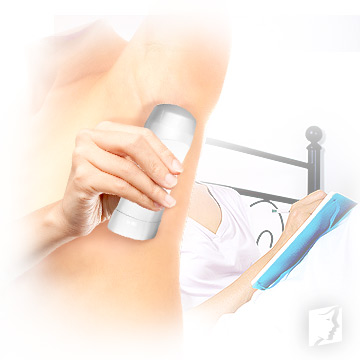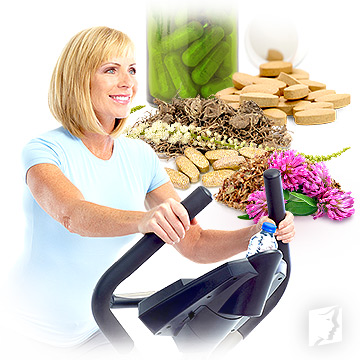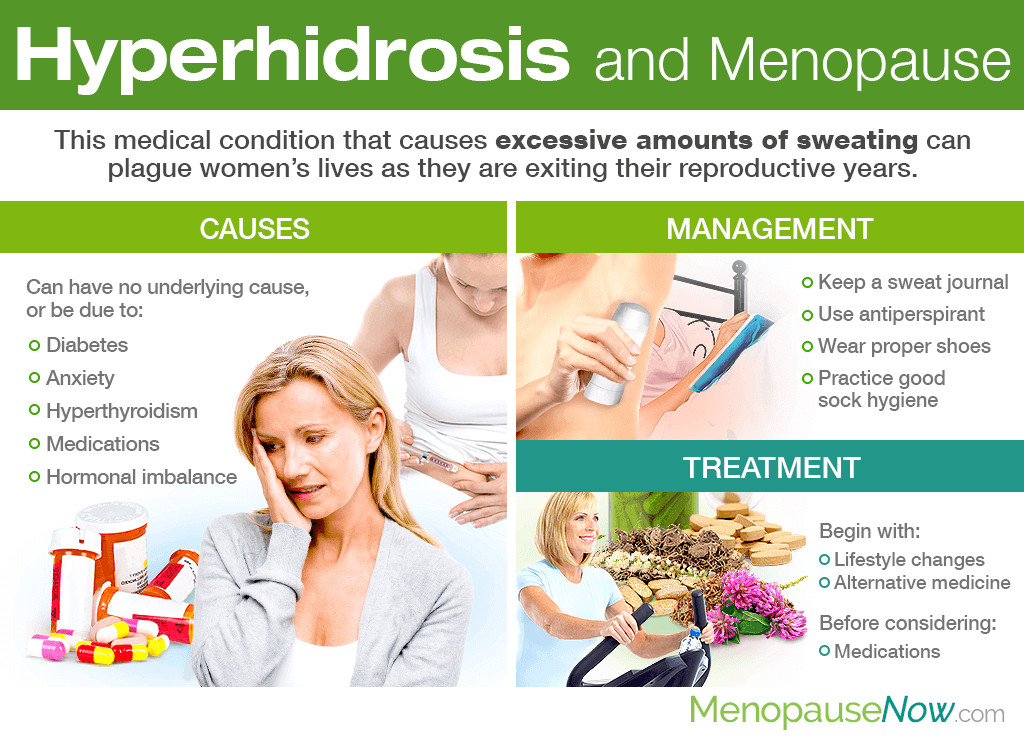As women are ending their fertile years, a plethora of menopause symptoms may surface, hyperhidrosis being one of them. As embarrassing as it is annoying, hyperhidrosis during menopause does not have to be a new norm. Continue reading to learn all about hyperhidrosis and menopause, including more about the condition, its causes, management, and treatment options for ultimate, long-term relief.
About Hyperhidrosis
Hyperhidrosis is a medical condition that causes excessive amounts of sweating when the body does not need cooling.
Many women who suffer from hyperhidrosis sweat excessively from only one or two areas of the body, which include the head, underarms, palms, or feet. The rest of the body remains dry.
Causes of Hyperhidrosis during Menopause

There are two types of hyperhidrosis: primary and secondary.
Primary hyperhidrosis is what heavy sweating with no underlying medical cause is referred to as. It occurs when certain nerves overreact and call for perspiration when it is not needed. This type can be hereditary.
On the other hand, secondary hyperhidrosis is excessive sweating that can be attributed to an underlying medical cause, such as:
- Diabetes
- Tumors
- Weight gain or obesity
- Stress
- Anxiety
- Heart attack
- Heat exhaustion
- Hyperthyroidism
- Medication side effects
- And more
It is believed that unpredictable hormonal fluctuations - of estrogen and progesterone - caused by the cessation of reproductive functions could possibly explain the connection between hyperhidrosis and menopause, yet further research is needed to solidify this claim.
Management of Hyperhidrosis during Menopause

No matter the body parts affected, effectively managing hyperhidrosis during menopause can start with a few simple tips, including:
Keeping a sweat journal. Certain situations or foods can trigger hyperhidrosis - and even hot flash - episodes, such as alcohol, spicy foods, caffeine, and monosodium glutamate (MSG). Noting potential triggers could help you control both symptoms.
Using an antiperspirant. Deodorants mask or stop body odor, but they still allow you to sweat. On the contrary, antiperspirants reduce sweating completely.
Wearing the proper shoes. Wearing well-ventilated shoes will allow air to circulate. Also, avoid wearing the same pair of shoes two days in a row, and try airing your feet your completely in sandals whenever possible.
Practicing good sock hygiene. Wear moisture-wicking socks. Change socks daily or more often if they are wet, and wash socks before wearing them again.
Carrying an extra pair of clothes. If needed, keep an extra pair of clothes at hand at all times so that you can change into fresh garments after a hyperhidrosis episode.
While these management tips may provide short-term relief from hyperhidrosis, menopausal women will find ultimate relief only through treatment.
Treatment of Hyperhidrosis during Menopause

Natural and effective menopause symptoms treatments address the underlying cause of hyperhidrosis during menopause, hormonal imbalance.
Principally, they start with less invasive and less risky lifestyle changes that are composed of an optimized diet rich in foods with phytoestrogens, plant-based estrogens that will the hormonal gap; regular exercise 30 minutes a day, five days a week to boost mood and manage a healthy weight; and healthy habits of quitting addictions, getting proper rest, de-stressing, among others. A combination of all will foster endocrine system health.
However, for optimal results, women are recommended to combine efforts alongside the use of alternative medicine, such as phytoestrogenic herbal supplements or hormone-regulating supplements.
Phytoestrogenic herbal supplements, like black cohosh or red clover, contain stronger concentrations of phytoestrogens, directly battling an estrogen imbalance that may or may not be at fault for the hyperhidrosis. However, because these supplements contain powerful outside hormones, they are not recommended for long-term use as the body may become dependent upon them for hormonal balance.
On the other hand, hormone-regulating supplements, such as Macafem, nourish and encourage the endocrine glands to produce more of their own hormones, thus alleviating not only hyperhidrosis, but also other menopause symptoms of hot flashes, night sweats, mood swings, and more. They are safer for long-term use as they do not contain exogenous hormones.
Women who are suffering from hyperhidrosis due to other causes should consult with their doctors in order to create a personalized treatment plan that may consist of the use of medications.
Key Takeaways
Hyperhidrosis is a medical condition that provokes excessive amounts of sweating. It may either be attributed to an underlying medical condition - like diabetes, anxiety, or hyperthyroidism - or none at all. For menopausal women, drastic hormonal fluctuations as fertile years are ending are often to blame. While instilling management techniques such as keeping a sweat journal to identify triggers and using antiperspirant may help at first, long-term relief can only be found by addressing the underlying cause of hormonal imbalance. This is done through the implementation of lifestyle changes alongside the use of alternative medicine. A little initiative will go a long way in keeping hyperhidrosis under control for good.
Sources
- American Academy of Dermatology. (n.d.). Hyperhidrosis: Tips for Managing | Hyperhidrosis: Who Gets and Causes | Hyperhidrosis: Overview. Retrieved July 9, 2019, from https://www.aad.org/public/diseases/dry-sweaty-skin/hyperhidrosis#tips | https://www.aad.org/public/diseases/dry-sweaty-skin/hyperhidrosis#causes | https://www.aad.org/public/diseases/dry-sweaty-skin/hyperhidrosis
- Mayo Clinic. (2018). Excessive sweating: Causes. Retrieved July 9, 2019, from https://www.mayoclinic.org/symptoms/excessive-sweating/basics/causes/sym-20050780

